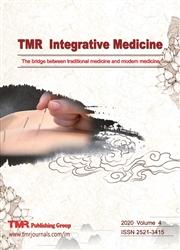Meta-analysis of ear acupoint therapy to treat sleep disorders in hemodialysis patients
引用次数: 0
Abstract
Background: To evaluate the therapeutic effect of auricular therapy on sleep disorders in hemodialysis patients using meta-analysis methods, and to provide evidence-based support for clinical practice. Methods: PubMed, Embase, Cochrane Library, Chinese Biomedical Literature Database, China Journal Full-text Database, Chinese Science and Technology Journal Full-text Database, and Wanfang Resource Database were searched up to February 2023. Randomized controlled trials of auricular therapy for sleep disorders in hemodialysis patients were collected and included in the study. Meta-analysis was performed using RevMan 5.3 software. Results: 587 patients from 7 randomized controlled trial studies were included. The auricular therapy group had better sleep conditions than the conventional care group, as evaluated by the Pittsburgh Sleep Quality Index, in terms of total Pittsburgh Sleep Quality Index score (mean difference (MD) = –5.11, 95% confidence interval (CI) (–5.25, –4.96), P < 0.00001), subjective sleep quality (MD = –0.64, 95% CI (–0.72, –0.56), P < 0.00001), falling asleep time (MD = –0.37, 95% CI (–0.49, –0.26), P < 0.00001), sleep time (MD = –0.38, 95% CI (0.44, –0.32), P < 0.00001), sleep efficiency (MD = –0.15, 95% CI (–0.23, –0.07), P < 0.0001), sleep disturbances (MD = –0.18, 95% CI (–0.28, –0.09), P = 0.0002), daytime dysfunction (MD = –0.89, 95% CI (–1.18, –0.6), P < 0.00001), and hypnotic medication (MD = –0.22, 95% CI (–0.4, –0.03), P = 0.02). Conclusion: Auricular therapy is an effective method for improving sleep quality in hemodialysis patients, providing evidence-based support for clinical practice.耳穴疗法治疗血液透析患者睡眠障碍的meta分析
背景:采用荟萃分析方法评价耳穴治疗血液透析患者睡眠障碍的疗效,为临床实践提供循证支持。方法:检索至2023年2月的PubMed、Embase、Cochrane图书馆、中国生物医学文献数据库、中国期刊全文数据库、中国科技期刊全文数据库、万方资源数据库。收集并纳入血液透析患者耳穴治疗睡眠障碍的随机对照试验。采用RevMan 5.3软件进行meta分析。结果:纳入7项随机对照试验研究的587例患者。耳穴治疗组比常规护理组更好的睡眠条件,以匹兹堡睡眠质量指数评价,用匹兹堡睡眠质量指数评分(平均差(MD) = -5.11, 95%可信区间(CI) (-5.25, -4.96), P < 0.00001),主观睡眠质量(MD = -0.64, 95% CI (-0.72, -0.56), P < 0.00001),睡眠时间(MD = -0.37, 95% CI (-0.49, -0.26), P < 0.00001),睡眠时间(MD = -0.38, 95% CI (0.44, -0.32), P < 0.00001),睡眠效率(MD = -0.15, 95% CI (-0.23, -0.07), P < 0.0001),睡眠障碍(MD = -0.18, 95% CI (-0.28, -0.09), P = 0.0002),白天功能障碍(MD = -0.89, 95% CI (-1.18, -0.6), P < 0.00001),催眠药物(MD = -0.22, 95% CI (-0.4, -0.03), P = 0.02)。结论:耳穴疗法是改善血液透析患者睡眠质量的有效方法,为临床实践提供循证支持。
本文章由计算机程序翻译,如有差异,请以英文原文为准。
求助全文
约1分钟内获得全文
求助全文

 求助内容:
求助内容: 应助结果提醒方式:
应助结果提醒方式:


